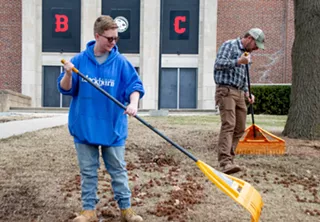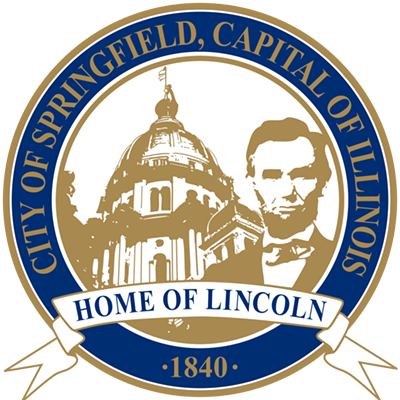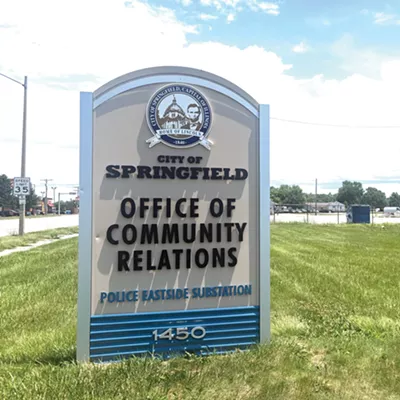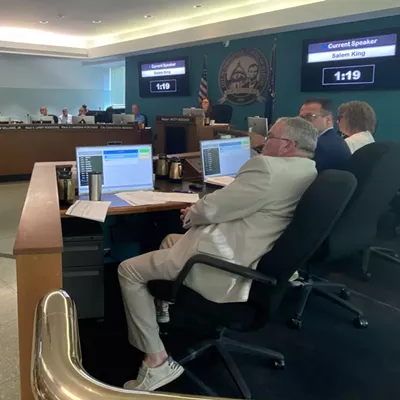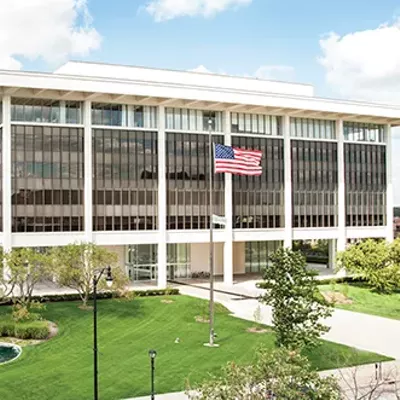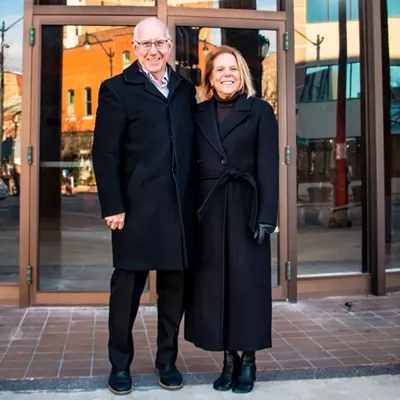College increases opportunities for students with diverse abilities
By Carey Smith
“According to the Bureau of Labor and Statistics, as of 2021, only 19% of Americans with a disability are even employed,” states Brianna Sutton, director of Blackburn College's Blackburn and Beyond program. “Disability does not mean inability.”
Born from a partnership with Carlinville High School, Blackburn and Beyond seeks to go beyond standard disability services to fully support a student with a cognitive impact, or intellectual or developmental disability. Students enrolled in the program are supported by a neurotypical Blackburn student who acts as a one-on-one mentor. Sutton trains mentors “so they have resources available to work better with neurodivergent students,” providing them assistance with classes, the work program or residence life.
“We do evaluations with mentors as well,” Sutton says, to track the needs of neurodivergent students. “We create goals for students in four areas: academic, social, independent functioning and vocational. We monitor progress weekly and work closely with mentors to better support and help meet goals.”
Students may enroll in any course offered by Blackburn College, with the option of seeking a bachelor's degree or auditing classes to receive a certificate.
“It's individualized to the student and their needs and functionality,” says Sutton.
In addition to coursework pertaining to their major, students take classes that are specifically designed for the Blackburn and Beyond program including finances, informational reading and writing, and a work experience class. Students may live on campus in a dormitory, or live off-campus and commute.
Blackburn College is one of just 10 work colleges in the nation, and the only one that is exclusively student-run. Students work in a variety of on-campus jobs in return for tuition credit, graduating with years of work experience and references, giving Blackburn students a head start in their post-college careers.
“We work closely with Blackburn's very unique student-led work program,” notes Sutton. “It's a big aspect of our program.”
While all colleges offer disability services, sometimes this service is not enough of a support or the right support to enable a disabled student to thrive. “It needs to be more individualized and tailored to the students. That's the goal of the program,” states Sutton.
“There are so many factors that come into play into getting neurodivergent individuals into higher education,” says Sutton. “If schools and workforces focus on what they can do, we'd have a much higher number and a lot more success. The purpose of our program is not only to support individuals who are neurodivergent but also to provide the most typical college experience possible for them. We are trying to pioneer and encourage colleges to provide an equal opportunity to all students to have an equal education.”
Dr. Cindy Rice, Blackburn’s education department chair and coordinator of the Blackburn and Beyond program, says that currently their biggest need is for community partners. “We need business partnerships, not for financial reasons, but for life reasons. So many businesses have positions that could employ our students when they complete their education. What a win-win for both, to have a competent individual who can work for you but also expresses your commitment for a diverse workplace.”
Rice notes, “Such a large number of disabled students are unemployed, who are fully capable of working in every business, given the opportunity. There are a number of citizens this marginalization affects, who can contribute so much to everybody around them.”
Rice says Blackburn and Beyond's program supporting neurodivergent students “is just the right thing to do. Blackburn is about doing the right thing, always committed to serving individuals who might otherwise not be served.”
If you are interested in becoming a community partner to Blackburn and Beyond, please contact Brianna Sutton at brianna.sutton@blackburn.edu or Cindy Rice at cindy.rice@blackburn.edu.
Carey Smith is a Blackburn alum with a neurodivergent child and is very excited about this program.
NOTE
The terms “neurotypical” and “neurodivergent” refer to differences in brain structure which affect how we think, learn, process and behave. Most people are neurotypical, which is how society expects most people to function. About one in seven people are considered neurodivergent and may function outside these societal norms with labels such as autistic, dyslexic, ADHD or Tourette's syndrome. Neurodivergent students and employees often need accommodations to meet societal expectations, but their unique traits can also bring a diversity of perspectives and problem-solving to the workplace.

